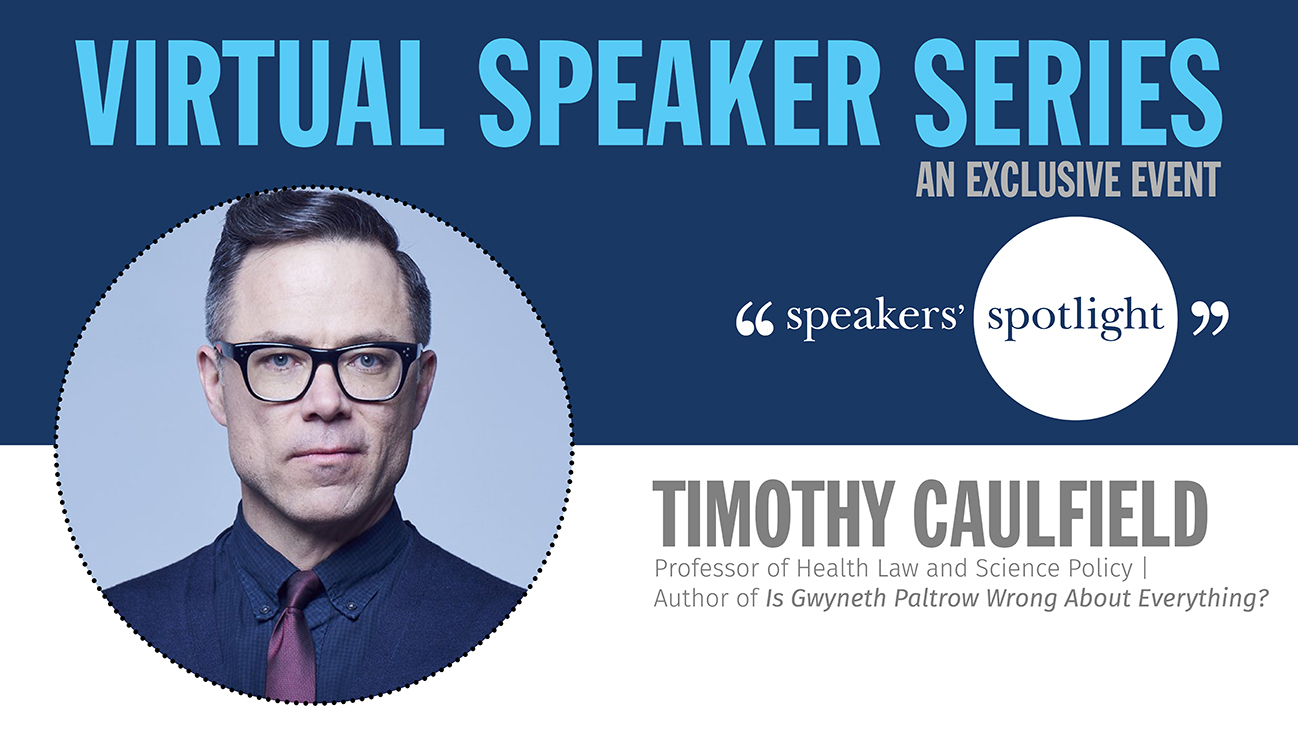Since March, many of us have had to become amateur healthcare experts, trying to keep up with the news, guidelines and general torrent of information about the COVID-19 pandemic. Unfortunately, plenty of bad science and misinformation has surfaced over the past 6+ months and continues to spread wildly—whether about the virus itself or “miracle” cures. We were joined for our latest Virtual Speaker Series session by Professor Timothy Caulfield to better understand why this is and, more importantly, how to combat it.
To begin, Timothy made it clear that we’ve been living in a very chaotic ecosystem for a long time and the coronavirus outbreak has only exacerbated this problem. He said that the internet, and more specifically social media, has allowed for the broad proliferation of unfounded conspiracy theories and claims. Because they’ve become so widespread, it’s quite possible you’ve already encountered some of the most popular of these completely unproven theories that are actively being spread and shared: That COVID-19 is caused by 5G cellular technology; that it came from a bioweapons lab or even a comet; and that it’s part of a plot by Bill Gates and other “global elites” as part of a plan to force a vaccine containing a microchip on the world’s population. Then of course, there’s also the section of the public that the virus is a complete hoax, which is usually wrapped up in one of the larger conspiracy theories involving plans for global control.
All these false claims have taken hold to varying degrees, and throughout his presentation Timothy provided statistics from numerous peer-reviewed studies which make it clear why this is such a serious issue. Numbers like:
- More than 1 in 5 UK residents believe the virus to be a hoax.
- 3 in 10 Americans believe COVID-19 is a product of a laboratory.
- 28% of Americans believe the conspiracy theories involving Bill Gates.
- Approximately half of all adults in the US hold at least one misconception about the prevention or treatment of the coronavirus.
- In Canada, nearly half of a group surveyed said they believed in at least one of the COVID-19 conspiracy theories.
Timothy said that generally among these studies a common thread is that people who hold misconceptions or believe conspiracy theories about the virus get most of their news from social media. Facebook in particular, he said, was guilty of hosting and spreading a huge amount of false or unsupported info since the start of the pandemic. Celebrities in particular are huge drivers of conspiracies, bad info, and especially unproven wellness products/regimens, Timothy said. The appearance of authority and wide reach of celebs in particular often make them “superspreaders” of misinformation. A prime example of this is President Donald Trump. Timothy pointed to a study that showed President Trump is the single biggest source for misinformation about the coronavirus on social media.
So, what’s the impact of all this? Timothy said the effects are really quite widespread: from possible stigma and discrimination against certain people to physical harm and even death—either because of the virus itself or unsafe cures and treatments. In the long-term, all this could lead to serious distrust in the government and healthcare systems, which could seriously jeopardize any eventual vaccine program. Timothy reminded us that, as frustrating as this can be, it’s a natural outcome of the avalanche of info we all deal with on a daily basis. The more information we take in, the harder it becomes for us to parse what’s true from what’s false.
To act against the tidal wave of misinformation we face, Timothy suggested a few strategies. The first is that we must keep governments and organizations accountable to do all they can to improve education and limit the spread of harmful false info. Social media organizations can make sure that problematic posts are flagged or even removed. The mainstream news media—which Timothy actually highlighted as having been generally quite reliable and accurate so far throughout the past several months—can ensure that what they share is thoroughly fact-checked. Major news and government sources continue to be generally effective and trusted by the public at large, so they are an important part of this fight.
For the rest of us, he said we can do our part by trying to debunk false claims and bad science as it’s shared among our social circles. Timothy offered several tips on how we can best do this, we’re making a post online about something ourselves or simply talking to a friend. By being vigilant and thoughtful, we can work on this problem together to ensure our communities remain safe and health throughout the pandemic.
Tips for Effective Debunking
- Provide the science and facts.
- Use clear and shareable content.
- Reference trustworthy and ideally independent sources.
- Point to scientific consensus on certain issues.
- Be nice, authentic, and humble! Sometimes this can be tough but it’s very important.
- Consider how best to tell the story. A gripping narrative goes a long way.
- Highlight the gaps in logic or rhetorical tricks often used in misinformed posts.
- Make facts the hook, not just targeting the falsehoods.
- Remember that the general public is the audience, not hardcore deniers or conspiracy theorists.
Professor Timothy Caulfield is an unrivalled communicator who debunks myths and assumptions about innovation in the health sector — from research on stem cells to diets to alternative medicine — for the benefit of the public and decision-makers. He is a Canada Research Chair in health law and policy, a professor in the Faculty of Law and the School of Public Health, and a research director of the Health Law Institute at the University of Alberta.
Speakers’ Spotlight has been offering virtual presentations since 2009. We work with a range of speakers who are comfortable with presenting virtually on a variety of topics. If interested, contact us for more information.

